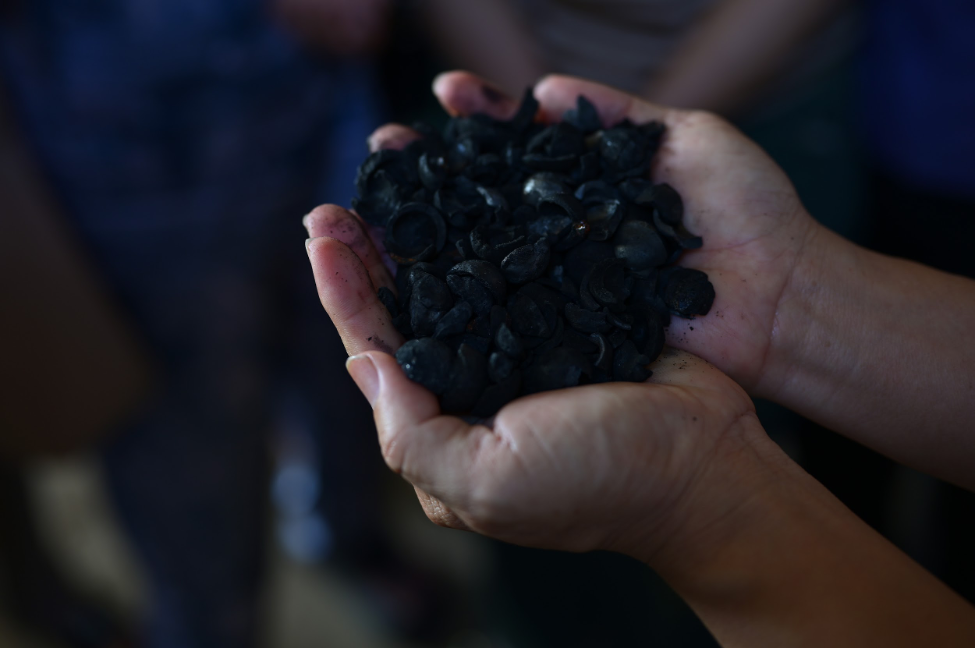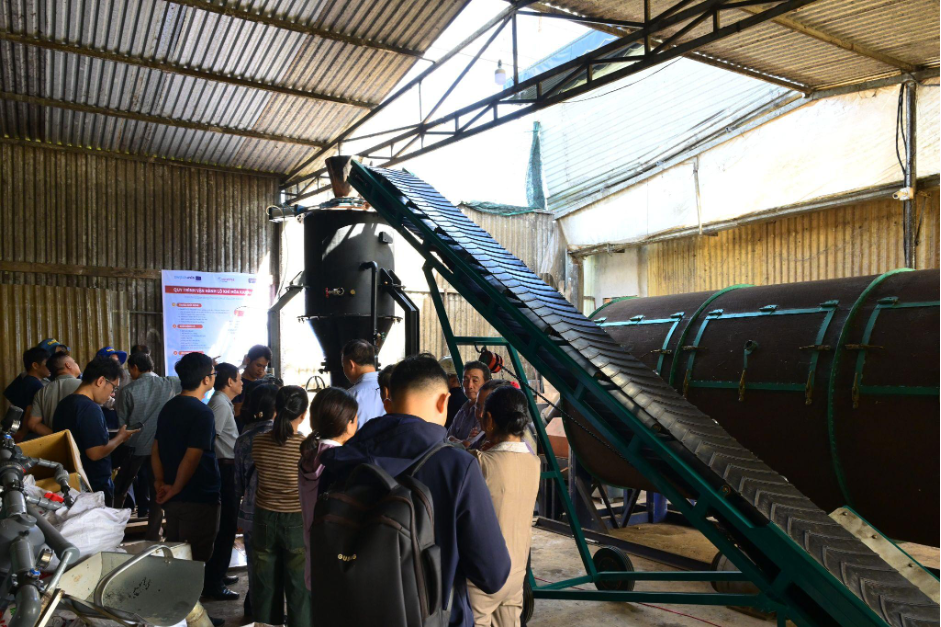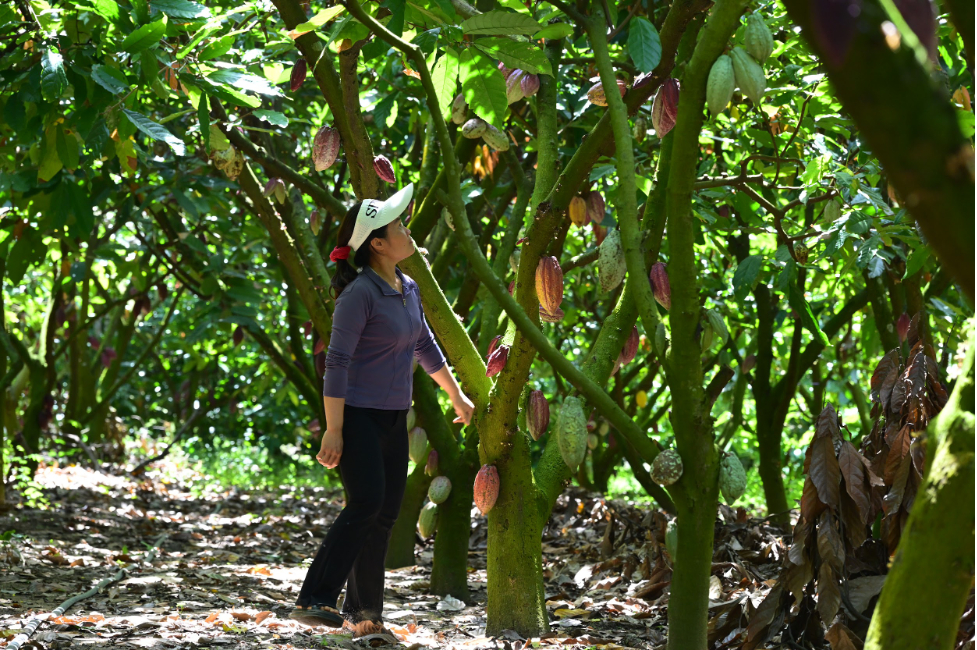
Since 2022, under the European Union–funded “Circular Economy Cocoa: From Bean to Bar” project, Helvetas Vietnam has introduced innovations aimed at reducing waste, increasing farmer income, and promoting more sustainable agricultural practices. Most recently, the organization unveiled a biochar gasification kiln equipped with an integrated heat transfer system at the Nhat Tam Agricultural Service Cooperative in Ea Kar district, Dak Lak province.
Agricultural By-Products: A Persistent Challenge in High-Rainfall Regions
Cocoa production typically leaves behind substantial by-products, with husks accounting for up to 70 per cent of each fruit’s weight. These husks are often discarded or burned in the open - practices that waste valuable biomass and generate harmful emissions. Similar challenges exist across other key crops such as coffee, macadamia, and rice, where farmers struggle to manage large volumes of post-harvest residues.
Extended rainy seasons compound these difficulties. Sun-drying becomes nearly impossible, and high humidity increases the risk of mold in cocoa and coffee beans, reducing quality and market value. Traditional drying systems, meanwhile, consume large amounts of fuel and generate significant emissions.
To help address these constraints, the project installed the KANAI-800 biochar gasification kiln at Nhat Tam Cooperative. The semi-automatic system uses pneumatic valve control and runs on locally available residues including cocoa husks, coffee husks, macadamia shells, and rice husks. During gasification, these materials are converted into syngas, a clean-burning synthetic gas. When fully combusted, syngas produces stable heat with minimal emissions, transferred through an integrated heat exchanger to maintain precise drying temperatures.

The system enables the cooperative to dry agricultural products continuously, around the clock, with a capacity of 5–15 tons per batch, entirely independent of weather conditions. The approach reduces energy costs while ensuring consistent crop quality, helping farmers secure better prices.
Biochar: The “Black Gold” of Sustainable Agriculture
A major advantage of the technology is its production of biochar, a highly effective soil amendment. Biochar enhances soil structure, boosts water retention, limits nutrient loss, and reduces reliance on chemical fertilizers. It also acts as a long-term carbon sink, storing carbon in the soil for decades or even centuries.
The biochar gasification system represents a practical model of circular agriculture: by-products are converted into valuable inputs rather than discarded. Drying operations rely on clean energy generated on site, reducing both emissions and costs. The process also yields biochar, which can be used to restore soil health or sold for additional income. The system is designed for straightforward operation and can be easily integrated into existing drying facilities, making it scalable across other commodity chains such as cashew, pepper, rice, and cassava. Altogether, the approach helps reduce expenses, improve product quality, and increase farmers’ income.
Mr. Pham Van Luong, Country Director of Helvetas Vietnam, emphasized: “This initiative reflects Helvetas’ broader efforts to promote more sustainable and circular practices in Vietnam’s agricultural sector. The model offers a practical way to make better use of local resources, improve production efficiency, and reduce environmental impacts.”
Ms. Nguyen Hong Thuong, Director of Nhat Tam Cooperative, shared: “Each year, our cooperative dries hundreds of tons of agricultural products. In the past, we consumed a lot of fuel and wasted large amounts of post-harvest residues. With the new gasifier, we can now make use of cocoa husks, coffee husks, macadamia shells, and rice husks as clean fuel - while also producing biochar to enrich our soil. Farmers are very excited because it helps us cut costs and create additional value for production.”
Mr. Duong Van Truc, Director of Saigon Clean Water and Environment Co., Ltd. (SAWAEN), the project’s technical partner, added: “Compared with drying systems powered by electricity or gas, the biochar gasification kiln can cut operational costs by up to 75 per cent, with a payback period of only about four months. Compared with firewood drying, it saves around 40 per cent in costs, with payback achieved in approximately nine months. This technology delivers tangible benefits both economically and environmentally.”

The integrated biochar gasification kiln and heat transfer system at Nhat Tam Cooperative is among the first demonstration models of circular agriculture in Vietnam. By combining modern gasification technology with abundant local residues, the model shows that circular solutions are fully achievable at the cooperative level. More than a technological upgrade, it marks a shift that empowers farmers to manage energy needs, improve product quality, and move toward more sustainable production practices.








 Google translate
Google translate